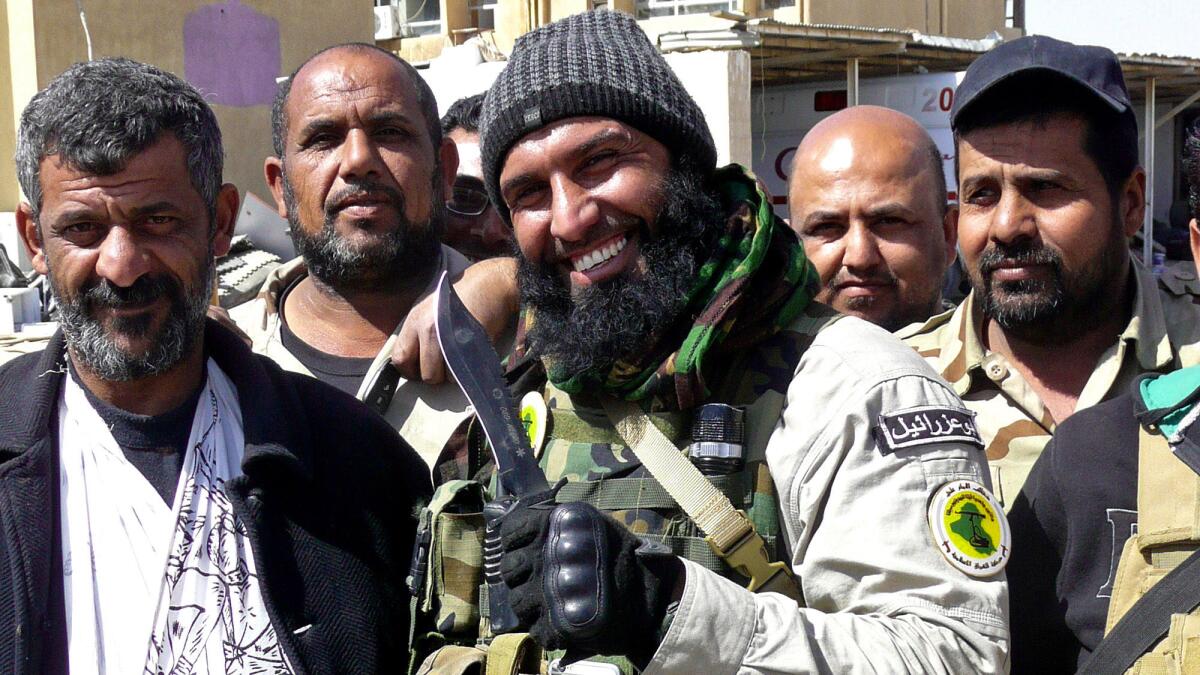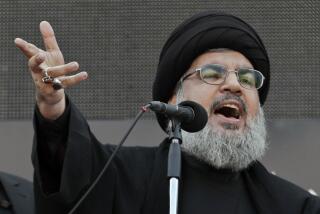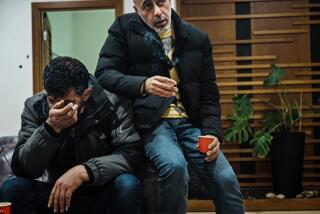Great Read: Iraq’s Rambo is the scourge of Islamic State militants

Abu Azrael, center, a hero among Shiite militiamen, poses with fighters near the northern Iraqi city of Tikrit on March 14, 2015.
- Share via
BAGHDAD — The men push forward, smartphones flying back and forth as they enlist whoever is closest to take their photo with the swarthy figure at the front of the crowd.
When it’s the next man’s turn, he approaches with reverence, planting a kiss on the cheek or forehead of the muscle-bound man with the shaved head and jet-black bushy beard. An awkward pose, a quick snap, and it’s on to the next acolyte, already in place.
Who is worthy of such attention? A movie star? A chart-topping singer? Nope.
He’s Iraq’s most famous Shiite militiaman, a fierce warrior whose nom de guerre — Abu Azrael — is an archangel of death in Islam. But the 37-year-old has another nickname: the “Iraqi Rambo.”
He is the scourge of Islamic State militants, who last year rampaged across large parts of Iraq and Syria. He taunts and mocks the Sunni extremists on social media, saying he has dispatched them in droves with an arsenal that would satisfy any video-game aficionado: a scoped rifle, hand grenades and, when things get dicey, an ax or sword.
His Facebook pages have garnered well over 300,000 “likes,” and his YouTube videos rack up hundreds of thousands — and occasionally millions — of views. (His presence at a recent funeral for a high-ranking militia leader almost derailed the somber proceedings.)
Convalescing in Baghdad after a battlefield injury sustained during the government’s latest offensive on the city of Tikrit — “a shell blast threw me off the armored carrier I was on,” he explains as he nonchalantly gestures to the cast on his right arm — Abu Azrael consents to a sit-down interview.
It’s a tightly choreographed affair, monitored by a media team from his militia, the Imam Ali Brigades, that would make any Hollywood PR firm proud.
“When the Iraqi people came under attack, I decided to leave my work and become a warrior to defend them,” he begins, describing himself as a “simple man who wanted to fight the evil of Daesh,” the Arabic acronym for Islamic State. And though those on the receiving end of his lethal blows (not to mention taunts) are Sunnis, he rejects accusations that he’s encouraging sectarianism.
Like your average action hero, his identity is shrouded in mystery. He acknowledges little more than being a “gentle father” to four daughters and a son.
And what does he do when he’s not fighting Islamic State? Is he, as some believe, a university lecturer in Islamic studies, or a fitness instructor who once won a taekwondo tournament, or, as he claims, a simple state employee who moonlights as a muezzin at his local mosque?
And what about his real name? Is it Ayyoub Faleh al-Rubaie or Ayyoub al-Zerjawi, only two of the names he has given to the press?
Abu Azrael won’t say, and with his menacing stare (not to mention the serrated military knife at his side), one doesn’t like to be pushy.
The secrecy, we’re informed, is to protect the fighter and his family from the many threats leveled against him by furious Islamic State supporters, who post gruesome videos of pro-government militiamen killed in battles with the taunting hashtag #Where_Are_You_Abu_Azrael?
He won’t confirm news reports that he began fighting in 2003 as part of the Mahdi Army, the militia of the Shiite cleric Muqtada Sadr, which fought against U.S. troops during the Iraq war. Neither will he admit fighting in Syria alongside forces loyal to Syrian President Bashar Assad.
He does, however, say that he first took the name Abu Azrael in 2003 because the angel of death meets “an evil person with brutality, and I wanted to meet those terrorists in that way.”
The Iraqi government and Shiite militias have long battled a Sunni insurgency that has appeared under different guises (including Al Qaeda in Iraq and the Islamic State in Iraq, the precursor to Islamic State). Whatever the name, pro-government media routinely describe the militants as “terrorists.”
Abu Azrael, however, has different words for his enemies: “illa tahin,” an abbreviated religious quote that literally translates to “nothing but flour” but means “you will be pulverized.” It has become the catchphrase he deploys whenever faced by Islamic State and its supporters.
Abu Azrael decided to join the Imam Ali Brigades, he says, because of the group’s “wise and religious leadership” and because he admired its integration of other sects into its ranks, such as anti-militant Sunni tribesmen and Yazidis.
“Other groups were at first reluctant to do so,” he says. “Now they have come to follow our way of thinking.”
The government has trumpeted the participation of Sunni tribal fighters in its recent offensive on Salahuddin province as a response to concern about a sectarian bloodbath by the Shiite-dominated armed forces.
Last year, Iraq’s top Shiite cleric exhorted followers to join militias and prop up the country’s armed forces, which had collapsed after a humiliating defeat at the hands of Islamic State.
Although the militias were credited with saving Baghdad from being overrun by the militant group, many feared a return of the Shiite death squads who engaged in reprisals against Sunnis during the sectarian bloodletting in 2006-07.
Back then, Shiites had a different hero: Abu Deraa, a Shiite paramilitary leader. Abu Deraa’s raids on Sunni neighborhoods and his penchant for drilling holes in the heads of Sunni captives earned him the moniker “the Shiite Zarqawi,” a reference to the Jordanian-born Sunni head of Al Qaeda in Iraq responsible for organizing vicious suicide bombings against Shiites.
Abu Azrael insists that he shuns sectarianism and that he and his comrades in the militias are holy warriors fighting to defend the oppressed against those who “kill and pillage in the name of Muslims.”
“I’m here to talk about terrorism. Any person who embraces Daesh, no matter what his religion may be, I will consider him a terrorist.”
Aside from his boasts about his fighting prowess, Abu Azrael is known for his gallows-inflected sense of humor.
In his best-known video, released in January, he’s seen riding on a children’s bicycle through a Sunni-dominated area presumably once packed with Islamic State militants and supporters, now rendered a ghost town.
“What a romantic setting! This is your brother Abu Azrael roaming around the city of the dead,” he says, flashing a toothy grin as the camera pans over the carcass of a dog.
“If we weren’t good-hearted people, we would have burned your houses down to the ground,” he goads the town’s absent residents-turned-refugees, adding that only houses with Islamic State flags were razed.
Abu Azrael explains that the video was shot in a Sunni area called Albu Hishmeh about 45 miles north of Baghdad, the site of intense clashes between Imam Ali Brigade and Islamic State fighters in December and January.
“This was me mocking these terrorists. They are nothing, because our soldiers are heroes.”
Although he’s swarmed by fans everywhere he goes, not everyone is happy about the focus on a fighter with a personality as outsized as his muscles.
“He’s a hero,” says Abbass, a traffic policeman sitting down to breakfast in a Baghdad roadside cafe.
“No, he’s not,” retorts another officer between mouthfuls of the omelet before him.
“He gets to have the best food, best weapons. But what about the heroes in the army and the police?”
He shakes his head. “No one cares about them. They get nothing, and they’ve done more than Abu Azrael.”
As Abu Azrael’s fame has grown, he has become a symbol for fellow militiamen, boosting morale whenever he shows up at a battle. Does he worry about being even more of a target now for the extremists?
“If it’s a matter of fear, I’m a fighter in God’s name and I fear nothing,” he says defiantly. “But of course I’m concerned for my family.”
Although the battle for Salahuddin continues, all eyes remain on Mosul, 225 miles north of Baghdad and the jewel in Islamic State’s crown. Observers expect the government will have a much harder — and much bloodier — fight on its hands.
Abu Azrael, however, insists he isn’t worried.
“Difficult, not difficult, we will be victorious, even if it requires the last drop of our people’s blood,” he declares.
“There is no other option, and martyrdom for us is honor from God.”
And what of the time after Islamic State is vanquished? Will he join the army or enlist in some kind of a national guard brigade?
Not for him the military life, says Abu Azrael, speaking wistfully of returning to his government position, sending his children to school and going back to the mosque to issue the call to prayer.
“I’m a civilian who was tasked by God to fight. Once that ends I will go back to my normal life,” he says. “And if they return, we will too. Illa tahin!”
Bulos is a special correspondent.
Twitter: @nabihbulos
For Zoey Tur, a new life as a transgender woman takes flight
Downtown L.A. drugstore sells folk medicine to bring love, money
More to Read
Sign up for Essential California
The most important California stories and recommendations in your inbox every morning.
You may occasionally receive promotional content from the Los Angeles Times.










